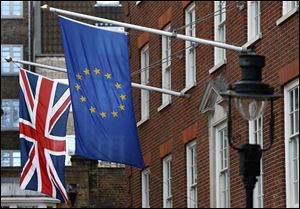
EDITORIAL
Making Brexit work
12/12/2017

The European Union and British Union flags fly in Westminster in London.
It is fascinating to watch the Brexit process — Britain’s exit from the European Union — unfold. Recently, the two parties agreed to move from the first phase to the second phase of departure negotiations.
One important element in what is being called a breakthrough in negotiations was agreement that there be no future “hard border” between the Republic of Ireland, which is a member of the E.U., and Northern Ireland, a province in the U.K. Northern Ireland will therefore be leaving the E.U., even though 56 percent of its voters rejected Brexit in the 2016 referendum. That question was causing some anguish, in both parts of Ireland, the United Kingdom, and the United States because it bears on the continued viability of the 1998 Good Friday agreement regarding relations, governance, and peace between the Nationalists and Unionists (largely Catholics and Protestants, respectively).
Click here to view more Blade editorials
The E.U.-U.K. decision against a hard border made a lot of sense. Reinstalling one would have involved, in effect, rolling back nearly two decades of constructive cooperation between the two parts of the divided island of Ireland. It was praised by Republic of Ireland Prime Minister Leo Varadkar.
Another sensitive question that has now been resolved is the issue of the rights already existing for the 1 million British citizens now residing in the other 27 E.U. countries and the 3 million of those countries’ citizens now residing in the United Kingdom. The rights of both groups will continue to be respected in their current countries of residence by both sides as Brexit proceeds. This decision relieves concerns and also stabilizes employment across Europe.
The timetable, according to European Commission head Jean-Claude Juncker and British Prime Minister Theresa May, is that the withdrawal plan will be completed by October and actual British withdrawal from the E.U. by March, 2019.
What the United Kingdom will have to pay the E.U. for debts it is still responsible for has yet to be determined. But observers estimate that it will come to between $35 billion and $40 billion. That will remain to be debated in the British Parliament and will no doubt also remain a heavy cross for Ms. May and her Conservative Party to bear, for it touches on the continuing question among the British: “Is Brexit worth it?”